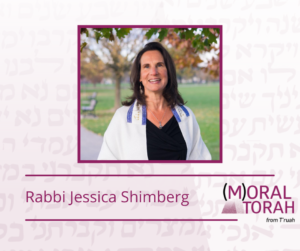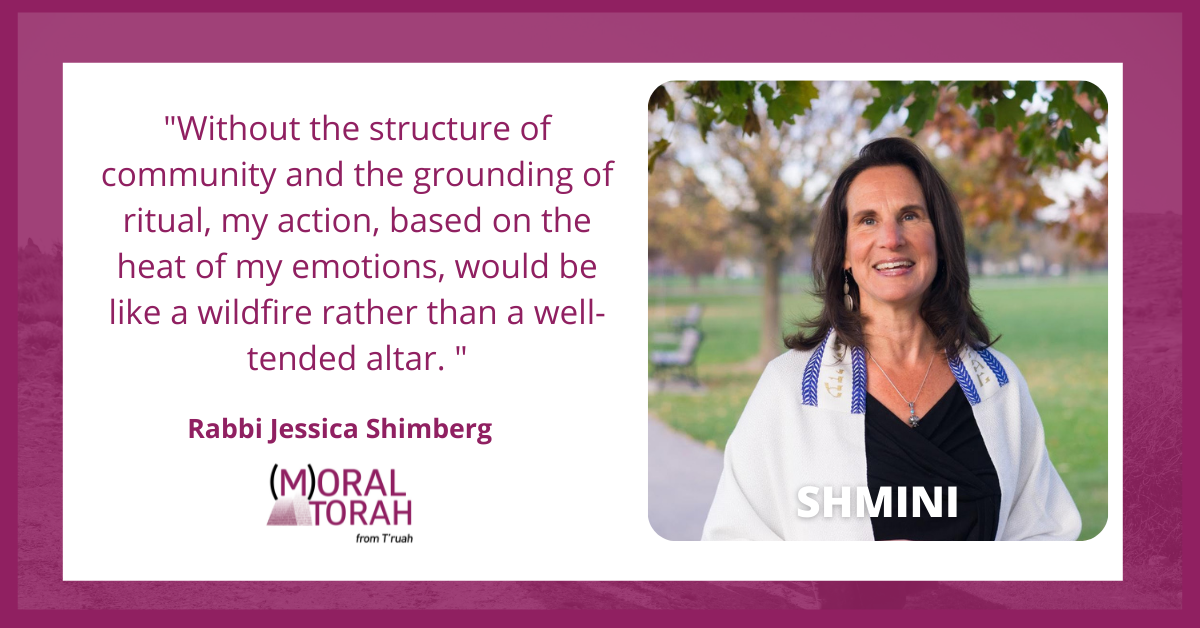A D’var Torah for Parshat Shmini by Rabbi Jessica Shimberg
Last week, I found and re-read the d’var Torah I offered when I became a bat mitzvah. In the 40-plus years since reading from Leviticus on that day, I have continued to wrestle with the relevance of its ancient rituals to our modern experience. This year, I am moved by the opening chapter of Parshat Shmini and the value of slow, deliberate, carefully orchestrated ritual. I am sensitive to the fact that we peer at this value through the distractingly vivid details of the sacred service of animal sacrifice. My teenage brain was too grossed out by the blood, fat, kidneys, and liver, flesh, and fire to appreciate the precision of the ritual and the seven days of preparation for performing holy service on behalf of a community. However, my lens for reading scripture has now been shaped by 40 additional years of lived experience, many of those as a communal leader and ritualist, and an extraordinarily meaningful rabbinical school class, brilliantly titled “Learning to Love Leviticus.” (Thank you, Rabbi Dr. Laura Duhan-Kaplan.)
Sign up to receive (M)oral Torah in your inbox each week.
Living in increasingly chaotic and uncertain times, I notice how grounding ritual is each time I immerse in it. Even so, it is tempting to turn away from that which is slow and deliberate to engage in the more rapid-fire and never-ending firehose of information, work, entertainment, and general distraction. In Parshat Shmini, the ritual is methodical, purposeful, and collaborative. Aaron and his sons work together, called to specific and delineated tasks, to perform a rite on behalf of the community. They are not doing this for themselves; rather, they are performing a service for societal expiation and well-being. In addition, they have spent seven days preparing themselves for this service to the collective. They are grounded when they rise to their calling.
In recent years, our socio-political climate has become so polarized and toxic, and the list of issues that are “on fire” – in need of immediate attention – are overwhelmingly numerous. It is easy to become enraged, unfocused, distracted, distraught. Exactly two years ago this week, as the pandemic began, I moved to Nashville, Tennessee, to marry my beloved. Though overjoyed to be with my b’shert, I left a community where I knew my place and how to deploy my calling. In the South, issues that have been central to my recent work as a faith leader, like abortion access and reproductive justice, are even more threatened and urgent. There have been days when I have been so incensed or overwhelmed that it has felt as if I am being consumed by a “strange fire,” as were Nadav and Avihu, Aaron’s sons who die in this week’s parshah. Without the structure of community and the grounding of ritual, my action, based on the heat of my emotions, would be like a wildfire rather than a well-tended altar.
Find more commentaries on Parshat Shmini.
Ritual and orchestrated communal action are an antidote to the hubris that causes us to act alone or the anger that can cause us to behave impulsively. They also can provide us with the strength and conviction to act when we might, alone, feel powerless or overwhelmed. I am grateful that my years of advocacy work with T’ruah, the Coalition of Immokalee Workers, Ohio Faith in Public Life, and Faith Choice Ohio taught me that rushing in to do things my way is not leadership. Addressing injustice and creating conditions for change requires deliberate action, and deliberate action requires thoughtful planning and collaboration and learning how to be an appropriate ally.
 Being selected to perform holy tasks on behalf of a community is both a great honor and a weighty responsibility. How we go about performing holy tasks is well served by humility, precision, dedication, and careful consideration. Ritual is a container that grounds and uplifts us.
Being selected to perform holy tasks on behalf of a community is both a great honor and a weighty responsibility. How we go about performing holy tasks is well served by humility, precision, dedication, and careful consideration. Ritual is a container that grounds and uplifts us.
Rabbi Jessica Shimberg is a tradition-appreciating, non-traditional spiritual guide and ritual artist who delights in working at the sacred fringes where she finds Jewish seekers and skeptics, allies and the Jew-curious, and many soulful activists. Her ritual practice, and that of many others, has been nourished by the 100% natural beeswax Havdalah candles (holdingthefringes.com) she braids in the sunshine of Tennessee, where she is cultivating community, appreciating love, and working on growing grace.

